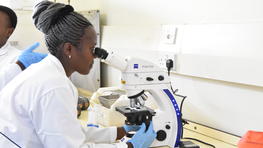Training on African Trypanosomiasis Diagnostic Techniques and Vectors Management at the International Centre for Insect Physiology and Ecology (icipe)
Kenyan Tsetse and Trypanosomiasis Control Teams Strengthened Through Refresher Training at icipe. This training was carried out between March 18th to 22nd 2024, and is part of the 4th pillar of the COMBAT project concerning capacity building.
The Animal Health team of the International Centre for Insect Physiology and Ecology (icipe) organized a training on African trypanosomiasis diagnostic techniques and vectors management from 18 to 22 March 2024 at icipe’s Duduville campus, Nairobi, Kenya. The training aimed to refresh the personnel from the Kenya Directorate of Veterinary Service (DVS) and the Kenya Tsetse and Trypanosomiasis Eradication Council (KENTTEC) on the recent progress in tsetse and trypanosomiasis management. A total of seven women and eight men at the forefront of tsetse and trypanosomiasis control participated in the training, which consisted of one day of theoretical course and four days of intensive laboratory and fieldwork. The theoretical courses were led by Tsetse & Trypanosomiasis experts from icipe and CIRAD. This part of the training covered a general introduction to biting flies and their chemical ecology, tsetse bioecology and their control tools, trypanosomes biology and their diagnostic tools, and the social impact of tsetse control. The laboratory practical focused on the identifications of tsetse, Stomoxys, tsetse dissection and parasitological identification of trypanosomes, such as molecular diagnostics of African trypanosomosis using conventional PCR and high-resolution Met qPCR. The last two days were spent in the field at the Nguruman field research station, allowing trainees to trap and identify tsetse flies, but also to collect blood sample from cattle and to perform parasitological analysis. The participants were also given the opportunity to attend the presentation by Dr. Geoffrey Gimonneau from CIRAD about the success story of the tsetse eradication program in the Niayes region in Senegal.
The trainees expressed their satisfaction and gratitude and requested that a similar training focusing more on biting flies of medical and veterinary importance be organized.
Parasitological observation © John Mark Makwatta, ICIPE
Blood sampled cattle at Nguruman © Geoffrey Gimonneau, Cirad
Published: 24/04/2024


